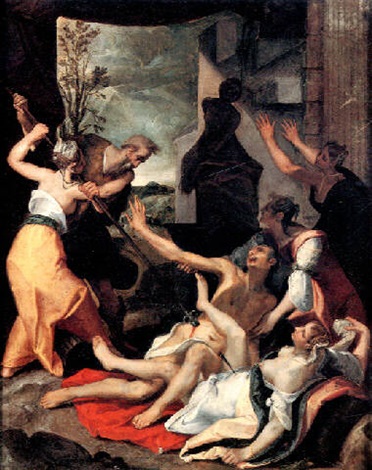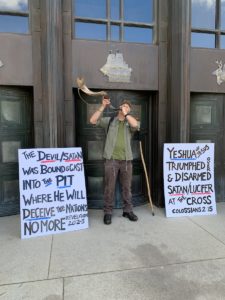
Who will rise up for me against the evildoers? Who will stand up for me against the workers of iniquity? (Psalm 94:16)
Numbers 25:7, Phinehas…took a javelin. Phinehas, the priest, rose up against evil—in this case, sexual immorality—and took a stand for righteousness, and YHVH commended him for it. Who are the Phinehases of today?
In standing against sin, Phinehas, the grandson of Aaron the high priest, was not acting as a self-appointed vigilante as it may appear. Rather, YHVH had given the priests, of which Phinehas was one, the authority to act as judges in Israel and to pronounce sentence in criminal matters (Deut 17:9–11). Additionally, Phinehas was doubly justified in his action against the fornicators, since he was an eyewitness of these sexual crimes, and the Torah teaches that the hand of the eyewitness was to be the first to rise up in executing judgment against the criminals (Deut 17:6; Ezek 44:24). So as an eyewitness and as a priest, he was legally justified in his actions. The priests and Levites were to act as Israel’s legal experts (Lev 10:10–11; Deut 24:8; 33:10; 2 Chron 17:9; 30:22; Neh 8:2, 8; Hag 2:11; Ezek 44:23; Mal 2:7) and to make determinations between the holy and the profane (Ezek 22:26; 44:23).

Who are YHVH’s priest on the earth today? According to Peter, and John the saints are those priests (1 Pet 2:7; Rev 1:6; 5:10; 20:6). As such, the saints presently possess the divinely mandated legal authority to fulfill the responsibilities of the priesthood of old when it comes to teaching the laws of Elohim to the nations in which they live (Lev 10:10–11). Moreover, Yeshua, our Great High Priest, has tasked his disciples with the responsibility and authority to judge righteously (i.e. to make judgments according to YHVH’s standards of righteousness, John 7:24), and to be spiritual fruit inspectors (Matt 7:15–20). Today, this responsibility is primarily exercised within the congregation of the righteous (1 Cor 5:12; 6:1–6). However, besides this, the righteous saints are to act as spiritual salt in this world and to be like a spiritual light on a hill for the world to see (Matt 5:13–16). This means that they are to preach the gospel to the world, to make disciples and to teach those around them all that Yeshua has commanded them (Matt 28:18–20; Mark 16:15–16). This means that the saints have heaven’s authority and commission to act as the spiritual and moral compass and conscience for the nations in which they live. This means that they will be standing against evil wherever and however they can as directed by the Spirit of Elohim, even as Phinehas did.
It is time that the righteous servants of YHVH Elohim begin to stand up in a more vocal and demonstrative way against the evil that is being foisted upon our society by those who are bent upon destroying the family, morality, and any vestiges of biblical standards of righteousness that may still exist around us. In Psalm 94:16, YHVH asks the question of his servants, “Who will rise up for me against the evildoers or who will stand up for me against the workers of iniquity?” With this in mind, the question we need to ask ourselves is this: If not me, who; if not now, when? If you have something worth living for, then do you have something worth giving your life for? If those who are caught up in demonically inspired religious systems are willing to die for their faith calling it “a holy war” and “martyrdom for their [demon] god,” can the saints of YHVH at least not take a verbal stand against the tide of evil that is sweeping our society?
The Bible is full of examples of YHVH’s servants standing against unrighteousness in their day and their receiving YHVH’s blessing for it. Several examples include the Hebrew midwives disobeying the edict of Pharaoh to commit infanticide (Exod 1:15–22), Phinehas executing judgment against the fornicators (Num 25:7–8), the three Hebrew children refusing to worship the golden image (Dan 3:8–18), Daniel violating the king’s edicts by praying to YHVH (Dan 6:10–12), John the Baptist criticizing Herod for his adultery (Mark 6:18), Yeshua turning over the money changers’ tables in the temple (Matt 21:12), and Peter and John for disobeying the Jewish leaders’ command to not preach the gospel (Acts 4:18–20). Many more examples could be given. Remember all the biblical prophets?
Numbers 25:11, Has turned back my wrath…because he was zealous. Read Psalm 94:16. What are some other examples of righteous men and women in the Bible who stood up against evil in their day whom YHVH praised for doing so? Did Phinehas rise up against evil in his own carnally-minded, emotionally-based zeal? If not, then whose zeal was he full of? (Read verse 11 again.) When we take a stand against evil as led by the Word and Spirit of the YHVH Elohim, can it ever be wrong to do so, even though the world may not agree with us and may even criticize or persecute us for doing so? Not only that, Phinehas placed his life on the line between the righteous judgment of Elohim and those who were sinning. Many times, the servants of YHVH actually have to leave their comfort zones and place themselves in harm’s way on the ragged edge between good and evil to take a stand for YHVH Elohim. (Note Aaron’s actions in Num 16:46–50.) The examples of such actions from the pages of the Scriptures are too numerous to list. Some notable examples include:

- Noah preaching righteousness against the utterly corrupt generation of his day.
- David versus Goliath (1 Sam 17)
- Elijah confronting the prophets of Baal (1 Kgs 18:20ff)
- John the Baptist confronting King Herod (Matt 14)
- Yeshua confronting the religious leaders of his day on numerous occasions (e.g. Matt 23)
- Peter and John versus the Jewish leaders (Acts 4)
- Stephen confronting the Jewish leaders (Acts 7)
- Paul and Silas preaching against false religion in Philippi (Acts 16) and preaching the gospel on the streets in Thessolonica (Acts 17), in Corinth (Acts 18) and again in Ephesus (Acts 19)
At times, YHVH tried to find such a person who would stand for his truth, but was unable to do so (see Jer 5:1; Ezek 22:30).
Numbers 25:11, In my jealousy.YHVH is a jealous Elohim. The word jealous is the Hebrew word qanna/TBBE(Strong’s H7067) meaning “to envy, be jealous, be envious, be zealous.” The ArtScroll Stone Edition Chumash states, “Jealousy is a person’s reaction when he finds that another is taking something that is rightly his. [Elohim] is jealous when Jews serve idols, because they transfer their allegiance from Him to something else.” p. 876). Torah expresses this same idea elsewhere:
Continue reading
